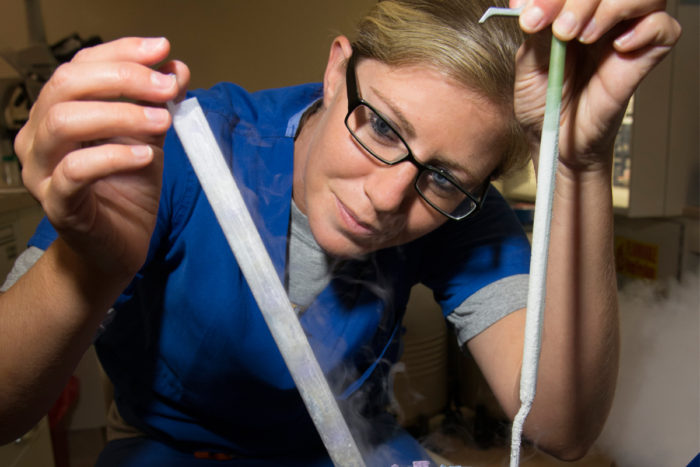Preserving fertility in male cancer patients
A Washington University study concludes that male cancer patients should more frequently be offered sperm banking as an option to preserve fertility

Retrieving frozen sperm samples at the Washington University Infertility and Reproductive Medicine Center.
According to a review of 20 years of sperm-banking records, cancer patients can bank sperm nearly as effectively as men banking sperm for infertility reasons. And the cancer patients are more likely than men with infertility issues to continue to store banked samples.
Cancer patients have a 15 to 30 percent chance of becoming infertile due to cancer therapies. In male patients, banking sperm before treatment is most effective when trying to preserve fertility. But not all oncologists make such a recommendation to their patients.
“Our study provides evidence that sperm banking is being used by patients with a myriad of cancer diagnoses and should be offered to all patients as the best means to preserve their fertility,” says Amber Cooper, MD, a Washington University reproductive endocrinology and infertility subspecialist at Barnes-Jewish Hospital.
In the study, researchers analyzed medical records of all patients who attempted to bank sperm from 1991 through 2010 in the Division of Reproductive Endocrinology and Infertility. The researchers collected and analyzed patient information such as quality of sperm and whether the sperm was used, disposed of or released to a surviving party if the patient died.
During that time period, 423 men with cancer and 348 banking for infertility reasons banked sperm in the unit. The most prevalent cancers among men who banked sperm were testicular cancer (32 percent), lymphoma (25 percent) and leukemia (11 percent).
Cancer patients vs. other infertility groups
The study found that semen quality—including sperm count and motility—was similar among the cancer and infertility groups. Compared to the infertility group, cancer patients banked samples longer and were more likely to continue ongoing storage. Forty-three percent of the cancer patients chose to keep their specimens in storage, compared with 23 percent of men who banked sperm for infertility reasons.
Cancer patients were less likely to use their samples, however; thirty-one percent of men who banked sperm for infertility reasons used their samples, compared with 8 percent of cancer patients.
“Our finding that cancer patients bank for longer than do men banking for infertility strongly supports the idea that sperm banking is a service that cancer patients highly value,” Cooper says. “We encourage oncologists to discuss sperm banking with all male cancer patients.”






